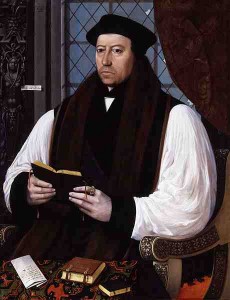 On 3rd May 1536, a very shocked Archbishop Thomas Cranmer wrote to King Henry VIII regarding his patron Anne Boleyn’s arrest. Here is his letter:
On 3rd May 1536, a very shocked Archbishop Thomas Cranmer wrote to King Henry VIII regarding his patron Anne Boleyn’s arrest. Here is his letter:
“Have come to Lambeth, according to Mr. Secretary’s letters, to know your Grace’s pleasure. Dare not, contrary to the said letters, presume to come to your presence, but of my bounden duty I beg you ‘somewhat to suppress the deep sorrows of your Grace’s heart,’ and take adversity patiently. Cannot deny that you have great causes of heaviness, and that your honor is highly touched. God never sent you a like trial; but if He find you no less patient and thankful than when all things succeeded to your wish, I suppose you never did thing more acceptable to Him. You will give Him occasion to increase His benefits, as He did to Job.
If the reports of the Queen be true, they are only to her dishonor, not yours. I am clean amazed, for I had never better opinion of woman; but I think your Highness would not have gone so far if she had not been culpable. I was most bound to her of all creatures living, and therefore beg that I may, with your Grace’s favor, wish and pray that she may declare herself innocent. Yet if she be found guilty, I repute him not a faithful subject who would not wish her punished without mercy. ‘And as I loved her not a little for the love which I judged her to bear towards God and His Gospel, so if she be proved culpable there is not one that loveth God and His Gospel that ever will favor her, but must hate her above all other; and the more they favor the Gospel the more they will hate her, for then there was never creature in our time that so much slandered the Gospel; and God hath sent her this punishment for that she feignedly hath professed his Gospel in her mouth and not in heart and deed.’ And though she have so offended, yet God has shown His goodness towards your Grace and never offended you. ‘But your Grace, I am sure, knowledgeth that you have offended Him.’ I trust, therefore, you will bear no less zeal to the Gospel than you did before, as your favor to the Gospel was not led by affection to her. Lambeth, 3 May.
Since writing, my lords Chancellor, Oxford, Sussex, and my Lord Chamberlain of your Grace’s house, sent for me to come to the Star Chamber, and there declared to me such things as you wished to make me privy to. For this I am much bounden to your Grace. They will report our conference. I am sorry such faults can be proved against the Queen as they report.”1
Cranmer’s shock at Anne’s arrest is clear in the letter but his support of the Queen is tempered with a fear of offending the King. We can also see that Cranmer is worried that the events will affect the King’s “zeal” for reform. Although people often criticise Cranmer for his cowardice, in not supporting Anne at this time, Cranmer’s biographer, Diarmaid MacCulloch2 points out that Cranmer’s action of writing this letter and the way he handles the situation show his wisdom and courage. At the end of the day, his allegiance lay with the King and he had to support him.
Also on this day in 1536, Sir William Kingston reported to Thomas Cromwell that Queen Anne Boleyn had told her ladies in the Tower that “she more feared Weston”.3 She elaborated, explaining that she had reprimanded Weston, a gentleman of the privy chamber, for loving her relative, Mistress Shelton, and not his wife, and he “made answer to her again that he loved on in her house better than them both”. When Anne asked who, he replied “It is yourself”. The Queen then “defied him” (ignored him). This was to be Sir Francis Weston’s undoing and he joined Sir Henry Norris, Mark Smeaton and George Boleyn in the Tower the following day.
Notes and Sources
- LP x.792
- MacCulloch, Diarmaid (1998) Thomas Cranmer: A Life, p157
- Cavendish, George (1825) The Life of Cardinal Wolsey, Vol 2, p219